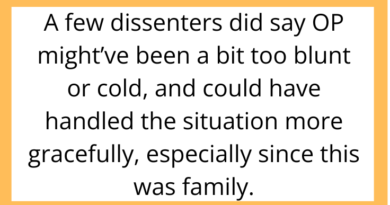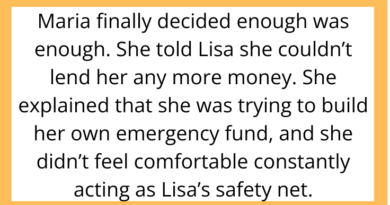AITAH for Refusing to Pay for My Friend’s Wedding After She Spent Her Budget on a Designer Dress?
Weddings can bring out the best—and sometimes the worst—in people. Especially when money, expectations, and long friendships collide. One Reddit user shared a story that quickly went viral: Am I the jerk for refusing to cover my friend’s wedding expenses after she spent her entire budget on a designer gown?
This scenario explores entitlement, financial boundaries, and whether friendship means footing someone else’s bill when things go wrong.
The Backstory: Champagne Taste on a Lemonade Budget

The Original Poster (OP) explained that her best friend of 10 years, Rachel, had been planning her wedding for over a year. They often talked about costs, vendors, and ways to save money. Rachel had a modest budget, just enough to cover a small ceremony, a catered dinner, and a simple dress.
But everything changed when Rachel “fell in love” with a designer gown that cost more than half of her total wedding budget. Against all advice—including OP’s—she bought it, insisting she’d “figure the rest out later.”
Soon after, Rachel ran out of money to cover essentials like venue deposits, flowers, and catering. She turned to OP and asked if she’d be willing to contribute a few thousand dollars “just until she got her tax refund.”
OP politely declined, saying she couldn’t afford to float that much money and didn’t think it was wise to cover someone else’s impulsive decision. The fallout was immediate: Rachel accused OP of abandoning her in her “time of need,” and mutual friends began pressuring OP to help “save the wedding.”
Now OP wonders: Am I the jerk for refusing to pay for my friend’s wedding when she spent her budget irresponsibly?
Financial Boundaries and Emotional Manipulation

When Helping Turns Into Enabling
It’s one thing to help a friend during a true emergency—like a medical crisis or sudden job loss. It’s quite another to bail them out after they blew their savings on a luxury item they didn’t need.
Many Redditors pointed out that OP’s refusal wasn’t about being stingy—it was about maintaining healthy boundaries. Covering Rachel’s costs would only reinforce the idea that others are responsible for her poor decisions.
The Guilt Trip Playbook
Rachel didn’t just ask for help—she demanded it, then shamed OP when she declined. This is a classic tactic in financial manipulation: creating urgency, framing it as a moral duty, and mobilizing mutual friends to pile on the guilt.
Reddit was quick to call this out for what it was—emotional blackmail.
The Wedding Industrial Complex: Why Do We Spend Beyond Our Means?

Keeping Up Appearances
In many cultures, weddings are seen as a public display of success and happiness. Social media fuels this further, making it feel like a “dream wedding” is a requirement, not a preference.
Rachel’s choice to buy the designer gown—even at the cost of the rest of her plans—shows how powerful that pressure can be. But just because someone feels compelled to overspend doesn’t mean others are obligated to rescue them.
Choices Have Consequences
By spending her entire budget on the dress, Rachel effectively decided that everything else came second. That was her choice—and she has to own it. Expecting friends to fund the consequences crosses a line from understandable disappointment to entitlement.
Reddit’s Verdict: Not the Jerk

The AITAH community overwhelmingly sided with OP. Here are a few standout comments:
“If she couldn’t afford the dress, she shouldn’t have bought it. You’re not her bank.”
“A wedding is a want, not a need. She prioritized a dress over everything else. That’s on her.”
“Her poor planning doesn’t make you responsible for fixing it.”
Many users also pointed out that giving in to Rachel’s demands would set a dangerous precedent—one where friends are expected to subsidize every future impulse.
The Reality of Adult Friendships and Money

Friends Aren’t Financial Backups
True friendship means offering support, empathy, and sometimes practical help. But it doesn’t mean handing over thousands of dollars to cover someone else’s luxury choices.
If Rachel truly needed a safety net, she could have:
-
Chosen a less expensive gown.
-
Scaled back her wedding plans.
-
Saved longer before committing to purchases.
-
Taken out a small loan if she felt it was essential.
Instead, she decided it was easier to guilt-trip her friend than to own her decisions.
Boundaries Are Healthy—Not Selfish
Saying no to a friend is hard. But saying no when your help would cause you financial strain—or reinforce bad habits—is sometimes the healthiest choice for both people involved.
OP’s boundary wasn’t an act of cruelty—it was an act of self-respect.
Final Thoughts: You’re Not the Jerk for Protecting Your Wallet

This AITAH story isn’t just about a wedding—it’s about learning to recognize when support turns into enabling.
Rachel’s situation was avoidable, and her expectations were unreasonable. OP did the right thing by standing firm.
Friendship doesn’t mean sacrificing your financial security for someone else’s moment in the spotlight. It means caring enough to say, “I love you, but I can’t do this.”


